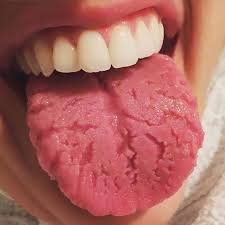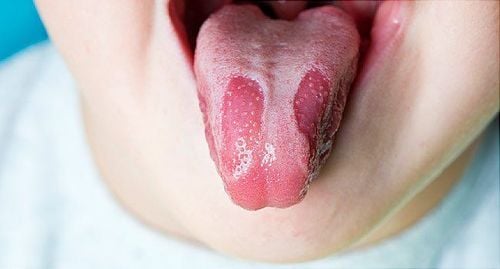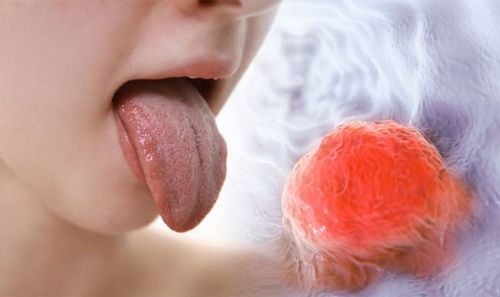This is an automatically translated article.
The article is professionally consulted by Master, Doctor Phan Ngoc Hai - Pediatrician - Neonatologist - Department of Pediatrics - Neonatology - Vinmec Danang International General Hospital.A cracked tongue is a benign condition that affects the upper surface of the tongue. This condition may be apparent in infancy or develop during childhood. The exact cause of the cracked tongue is still unknown. However, it can sometimes occur in connection with an underlying syndrome or condition, such as malnutrition or Down syndrome. So, what to do when the tongue is cracked?
1. What is a cracked blade?
A cracked tongue is a benign condition that affects the upper surface of the tongue. A normal blade has a relatively flat surface. But for some reason, one or more deep cracks can appear running down the length of the tongue giving the tongue a wrinkled appearance. The cracks have different sizes and depths.If you have a crack in your tongue, it may not cause a health concern. A cracked tongue occurs in about 5% of the world's population. Cracked tongue can appear at birth or between the ages of 1 and 5 years old.
The causes of cracked tongue are unknown, but sometimes it is related to a syndrome or an underlying health problem, such as malnutrition or Down syndrome.

1.1. Symptoms of cracked tongue
Cracked tongue can be manifested by the appearance of cracks as if the blade is split in half longitudinally, sometimes the number of cracks can be more. Deep grooves in the tongue are usually very visible. This makes it easier for doctors and dentists to diagnose a cracked tongue. The middle part of the tongue is the most affected part, but other areas of the tongue can also develop cracks.In addition, another problem that can also cause cracked tongue is glossitis. The symptom of glossitis is a coating of small pinkish-white knobs, which in many cases may be surrounded by a white border. People with map tongue often lack knobs in different areas of the tongue.
A cracked tongue or a map tongue is not a contagious or harmful condition, nor is it a symptom of a serious problem. However, a cracked tongue or glossitis can cause discomfort and increase the tongue's sensitivity to certain substances.
See also: Distinguishing glossitis and tongue cancer

Cracks, grooves or crevices appear on the top and sides of the tongue. These fissures only affect your tongue. Tongue fissures vary in depth, but they can be as deep as 6 mm. The grooves can connect with other grooves, separating the tongue into lobes or small sections. Cracks may first appear in childhood. However, fissures are more common in older people, and just as wrinkles can deepen with age, fissures can also become more pronounced with age. If you have regular dental checkups, your dentist will notice cracks in your tongue. This is how most cracks are found.
1.2. Causes of cracked tongue
Researchers and doctors cannot pinpoint the exact cause of a cracked tongue. Cracked tongue can be inherited because many studies have shown that people born into families with a father, mother or grandparent with cleft palate have a higher risk of developing this condition than others.In addition, cracked tongue can also be caused by a number of different underlying conditions. Many people think that a cracked tongue is another variation of a normal tongue. Signs of a cracked tongue can appear during infancy but become more severe and obvious with developmental age and become prominent as the person gets older.
Men tend to crack their tongue more easily than women, and older people with dry mouth often have more severe symptoms.
Cracked tongue is also sometimes associated with certain syndromes especially Down syndrome and Melkersson-Rosenthal syndrome. Down syndrome, also known as trisomy 21 syndrome, is a genetic condition that can cause a wide range of physical and mental defects. People with Down syndrome have 3 chromosomes 21 instead of 2 like the normal people. Meanwhile, people with Melkersson-Rosenthal syndrome often experience a number of neurological conditions characterized by cracked tongue, swelling of the face, upper lip, and facial paralysis.

Malnutrition and lack of certain vitamins such as vitamin A, folic acid, vitamin B12,... Granulomatous psoriasis allergies, a rare condition that causes swelling of the lips, mouth, and areas around the mouth.
2. What to do if the blade is cracked?
Usually, cracked tongue has no negative health effects and may not need to be treated.However, it is important to maintain proper oral care. Brush your teeth at least 3 times a day and rinse your mouth regularly to remove food debris, plaque, bacteria, and clean teeth and tongue. Bacteria and plaque can build up in the crevices, leading to bad breath and an increased risk of tooth decay.
Create a daily oral care routine that includes brushing, rinsing, and flossing instead of toothpicks. Visit your dentist at least twice a year for an early check-up, diagnosis and correction of dental problems.
In a nutshell, a cracked tongue is a condition where one or more cracks appear on the surface of your tongue. Cracked tongue is thought to be related to genetic conditions, oral hygiene, certain medical conditions such as malnutrition, psoriasis, allergic granulomatosis or Down syndrome and Melkersson-Rosenthal syndrome.
Usually, cracked tongue is not harmful to health and does not require treatment. However, each person should form good hygiene habits to avoid dental-related diseases.
Please follow the website: Vinmec.com regularly to update many other useful information.
Please dial HOTLINE for more information or register for an appointment HERE. Download MyVinmec app to make appointments faster and to manage your bookings easily.
Articles refer to sources: webmd.com, healthline.com














